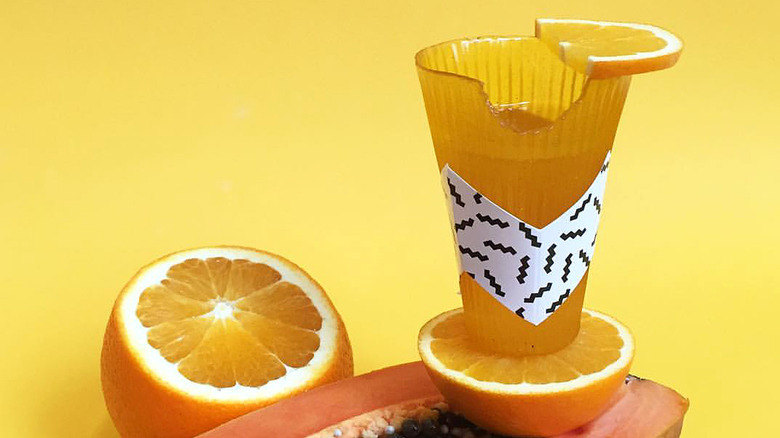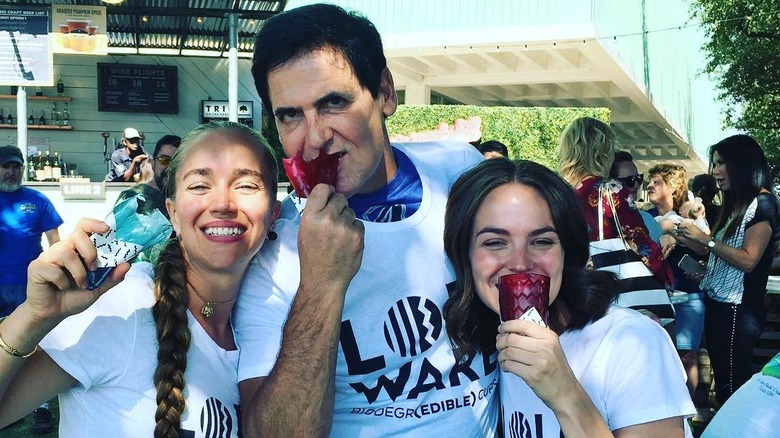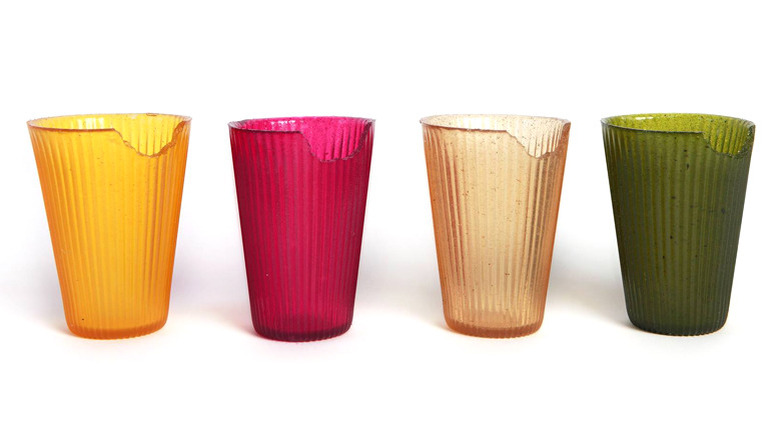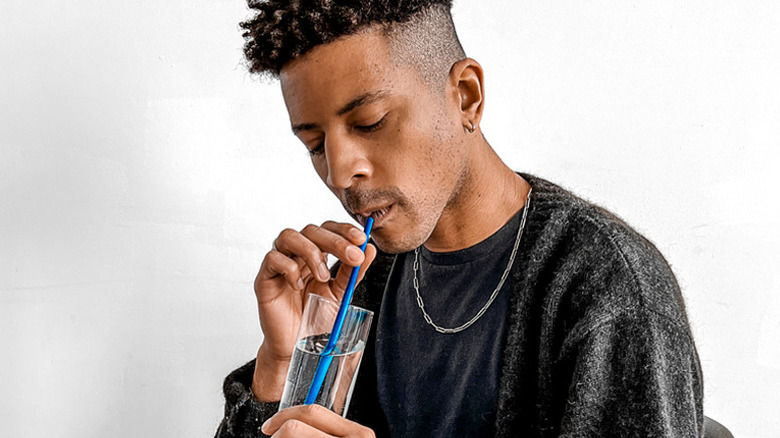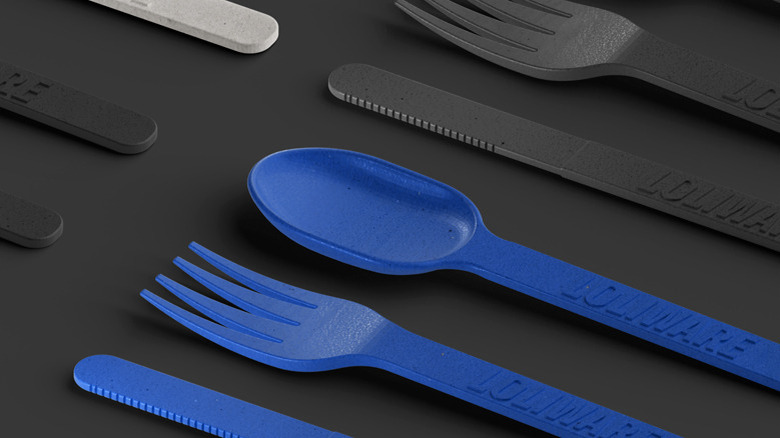Loliware: Here's What Happened After Shark Tank
We may receive a commission on purchases made from links.
The appearance of Loliware on "Shark Tank" was remarkable for a couple of reasons. The product was a breakthrough designed to replace disposable plastic with an edible, biodegradable option, but it also riled up the show's judges unlike anything else. Founders Chelsea Briganti and Leigh Ann Tucker concocted their material from a mix of sugars, seaweed, and natural ingredients to create a form of moldable agar-agar. Agar-agar is a plant-based gelatin alternative that is what dewy raindrop cakes are made of and is also used to make vegan gummy candy.
Having been raised in Hawaii, Briganti was disturbed by the tons of plastic that pollutes the oceans and ends up in landfills. In 2010, she partnered with fellow Parsons School of Design grad Tucker to come up with a solution. With $10,000 of their own funds, plus crowdsourcing $100,000, they developed an edible and compostable cup from their Jell-O-like substance which could hold cold drinks as well as desserts. The cups came in fun flavors including Madagascar vanilla, matcha green tea, pink grapefruit with yuzu, Thai cherry, and lavender honey.
They entered the cups into a competition where they did well and, in turn, went viral online. Within a week, the newly-named Loliware company received an order for 60,000 cups from Pernod Ricard, and by 2013, had made it onto Oprah's "50 Things That Will Make You Say Wow!" list. This caught the attention of "Shark Tank's" producers and prompted an invitation to be on the show.
What happened to Loliware on Shark Tank?
The Loliware "Shark Tank" episode aired on October 2, 2015, in season seven, episode two. Briganti and Tucker's wise financial decisions and profitable sales impressed the Sharks from the start, as did their sampling of the edible cups.
At the time of filming, the company had only been in business for three months but had generated $110,000 in sales. It had partnered with the event company Save The Date for a $1.3 million contract and had just signed with a major food distributor. Tucker explained that the product's cost was $0.97 per unit and sold for $1.50; however, they were in the process of lowering the cost to $0.50. She revealed they were 30% into a $1 million dollar investment round with an additional $100,000 committed.
Robert Herjavec wanted in but noted they would need a lot of money and he wanted more equity. He proposed partnering with another Shark to offer $600,000 (the outstanding amount on their fundraiser) for higher equity. Mark Cuban chimed in to join on $600,000 for a 25% stake — but that it didn't have to be with Herjavec, at which Kevin O'Leary and Barbara Corcoran also signified they wanted to partner up. Corcoran proclaimed that she'd rather go with Cuban due to the fact that he had three times the capital of everyone else. It eventually came down to Loliware's founders getting to decide who would make up their dream team. They chose Cuban and Corcoran.
Loliware after Shark Tank
Immediately after the episode aired, the company got a taste of the "Shark Tank" effect. Less than a day after the show, there were $140,000 in orders, and then, almost as quickly, the cups sold out.
Cuban's help was immeasurable in getting the company up and running, with the investor taking a role in steering production and pricing strategies, as well as promotion. In 2016, the Mark Cuban Companies Instagram account announced that Loliware would debut its 10-ounce berry flavored cups serving cotton candy soda at the Texas State Fair, replacing 50,000 plastic cups in the process. Despite a recent announcement that Mark Cuban is officially leaving Shark Tank, he remains an active partner in the business while there are no signs indicating that Barbara Corcoran's part of the deal ever went through.
Loliware went through other major changes post-"Shark Tank." Founder Leigh Ann Tucker left the company while Chelsea Briganti, who now goes by her nickname "Sea," remained at the helm. After releasing variations on the original cups, available for a short time, including a vitamin-infused line called Lolvita, as well as a coconut water-based cup, the company pivoted away from making cups altogether. Instead, a new line of edible drinking straws was introduced. The new product was created in an effort to combat the estimated 8.3 billion plastic straws that are strewn about the world's coastlines (per National Geographic).
Is Loliware still in business?
Loliware is still in business and has positioned itself as a major player in the edible seaweed and new materials verticals, with a focus on creating products that are "Designed to disappear" (via Loliware). By 2023, the company had raised $15.4 million, making it the "best-funded seaweed materials tech company" (per Loliware). The brand is developing new products, bringing its current pre-sales offerings into production, and licensing them in the U.S. and internationally.
At the forefront of the company's catalog is its Blue Carbon straw. Made from proprietary Sea Technology using a carbon-capturing seaweed blend, mineral colors, and shell powder, the straws are designed to address climate change and ocean pollution. Along with its standard drinking straw, the brand has introduced jumbo and boba varieties, and a special cocktail straw in another partnership with Pernod Ricard. In 2023, a deal was struck with the José Andrés Group to stock seaweed straws in its restaurants. The company is also producing seaweed utensil sets, eliminating the need for plastic cutlery.
In what is perhaps its most important development, Loliware has developed its Sea Technology into a resin that is available in pellet form. The pellets can be transformed into virtually anything that's made of plastic using the same type of injection-molding machinery. This means that the plastic alternative can be used on existing equipment without requiring businesses to make costly upgrades ... bringing the plastic-free future one step closer to reality.
What's Next for Loliware?
Loliware continues to innovate and envision a world that is not reliant on petroleum-based plastics. With its original products as just the starting point, the company is employing AI technology and working on new cups with lids, take-out containers, and bendable juice box straws (per Loliware and Tech Crunch). The company has recently hired Jeff Wooster to be a member of its Scientific Advisory Board. As the former Global Senior Sustainability Leader at Dow, his past experience is a valuable resource in advising the brand on future "partners, scaling, technology innovation, carbon footprint, and resin distribution" (via PR Newswire).
The brand has been recognized with numerous awards and continues to collaborate with other earth-friendly groups and coalitions. In 2021, Loliware received the Top Product of the Year Award from Environment + Energy Leader. In 2023, it was a winner of Google's Singe-Use Plastics Challenge, and in 2024, it was selected as one of Time Magazine and Statista's Top Green Tech Companies. In 2018, Loliware was chosen by the Sustainable Ocean Alliance to be part of its Ocean Solutions Accelerator program; then in 2022, it joined the Clinton Global Greenhouse Initiative, and in 2023, the Natural Polymers Group. The company has also been tapped to be part of the Unreasonable Food 2024 program in partnership with Mars Snacking. The program is geared towards providing support for companies in the sustainable foods industry. According to Unreasonable Food Group, to date, Loliware has raised $19.2 million.
"Shark Tank" is available for purchase on Prime Video.

